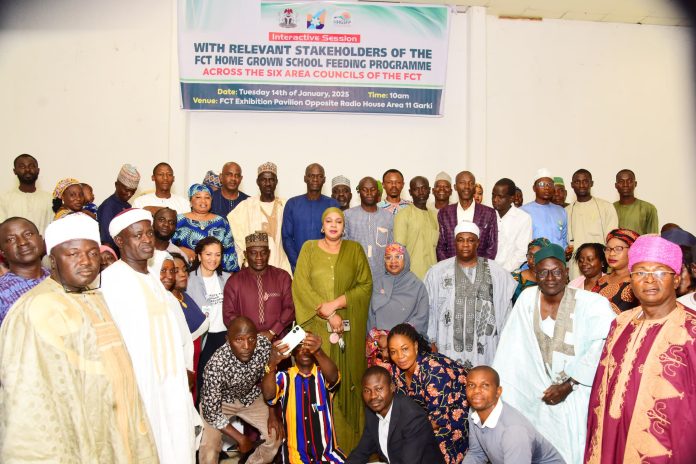The Federal Capital Territory (FCT) Minister of State, Dr. Mariya Mahmoud, has reaffirmed the critical role of the Home-Grown School Feeding Programme (HGSFP) in promoting local agricultural development, enhancing school enrollment, and improving learning outcomes.
Speaking at a stakeholders’ interactive session in Abuja, Dr. Mahmoud, represented by the FCT Focal Person on Social Investment Programme (SIP), Hajia Maijidda Adamu Kuku, highlighted how the program’s reliance on locally sourced produce empowers farmers and strengthens the rural economy.
“The Home-Grown School Feeding Programme not only addresses educational needs but also serves as a catalyst for agricultural development by providing a stable market for locally produced food,” Dr. Mahmoud stated.
Sustaining Impact and Addressing Challenges
The Minister emphasized the need for regular stakeholder engagement to sustain the program’s impact. She assured that the FCT Administration would maximize available resources to facilitate effective implementation, ensuring no school is left behind.
“We are committed to strengthening operations and fostering community participation through consistent dialogue among stakeholders,” Mahmoud said in a statement signed by her Special Assistant on Media, Mr. Austine Elemue.
She also commended the contributions of government officials, school administrators, community leaders, farmers, cooks, and development partners, urging stakeholders to bring innovative solutions to enhance the program’s efficiency.
National Recognition of HGSFP
Dr. Yetunde Adeniyi, Senior Special Assistant to the President on School Feeding Programme, described HGSFP as a flagship initiative that has significantly improved school enrollment and attendance.
“Since its inception, thousands of children have benefited from nutritious daily meals, which have directly contributed to increased retention rates and better learning outcomes,” Adeniyi noted.
She called on stakeholders to confront challenges proactively and ensure the program’s continuity.
Strengthening Transparency and Collaboration
Hauwa Abubakar, the FCT operations officer for the program, presented an overview of the stakeholders’ meeting, emphasizing the importance of community buy-in, transparency, and accountability. She also advocated for linking HGSFP to other empowerment initiatives in the FCT to maximize its impact.
In her goodwill message, Agnes Mungatia, a representative of the World Food Programme, underscored the need for enhanced collaboration among all stakeholders.
“The success of this program depends on robust partnerships, transparent operations, and a shared commitment to its goals,” Mungatia said.
A Model for Inclusive Development
The stakeholders’ session marks a renewed effort to address challenges and explore sustainable paths forward for the Home-Grown School Feeding Programme. As the program continues to empower local farmers, boost school enrollment, and improve nutritional outcomes for children, it remains a vital tool in achieving inclusive development across the FCT.

